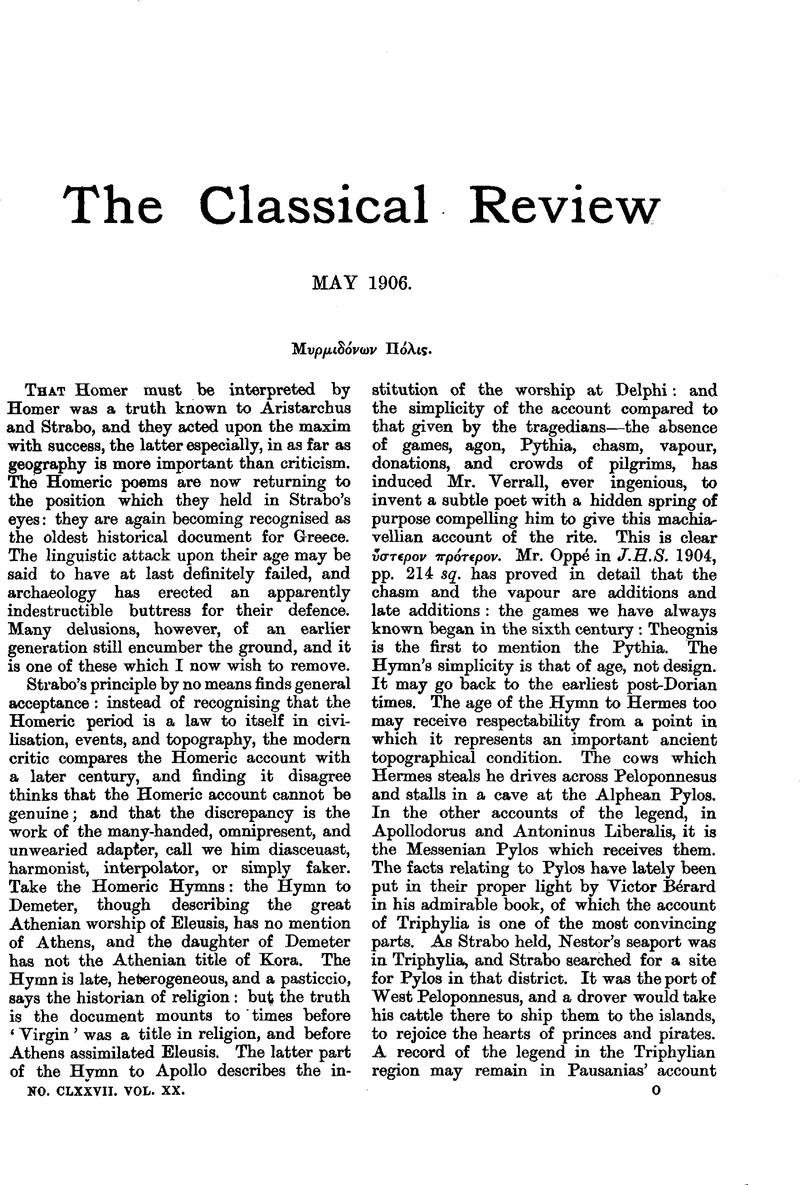No CrossRef data available.
Article contents
Abstract

- Type
- Original Contributions
- Information
- Copyright
- Copyright © The Classical Association 1906
References
page 194 note 1 I quite agree with Mr. Andrew Lang that it has always held its present place.
page 194 note 2 ![]() B 535. The lesser is defined by the greater. It is perverse to insist that πρην must mean ‘beyond’ and prove the writer to have been an Asiatic, Πρην ‘across from,’ is a variation on the fuller expression in 626
B 535. The lesser is defined by the greater. It is perverse to insist that πρην must mean ‘beyond’ and prove the writer to have been an Asiatic, Πρην ‘across from,’ is a variation on the fuller expression in 626 ![]() (which in its turn has produced the v. 11. on 535); both words meet in
(which in its turn has produced the v. 11. on 535); both words meet in ![]() 635. The description is ‘objective,’ that is, independent of personal standpoint, as in the parallel
635. The description is ‘objective,’ that is, independent of personal standpoint, as in the parallel ![]() , Paus. x. 8. 5 (cf. vii. 4. 3
, Paus. x. 8. 5 (cf. vii. 4. 3 ![]() ): Scymnus 587 uses a synonym,
): Scymnus 587 uses a synonym,![]() . If the ‘personal’ sense were obligatory, B 626 would land us in a contradiction, for on the same evidence the writer of that line would be a Peloponnesian!
. If the ‘personal’ sense were obligatory, B 626 would land us in a contradiction, for on the same evidence the writer of that line would be a Peloponnesian!
page 195 note 1 This reason, and nothing more recondite nor fraught with mystery, explains the selection of Aulis. A fleet composed of contingents from Cephallenia, Arcadia, Pylos, Sparta, as well as from Iolcus and Trachis, bound for Troy, must have had its rendezvous somewhere about Euboea. Nowadays international squadrons meet at Piraeus, before they seize the customs of Tenedos. Agamemnon chose for his ‘mille rates’ the ail-but land-locked straits of Aulis.
page 195 note 2 Strabo 430, 433, 434, notices how political change obliterates topography.
page 197 note 1 Bursian i. 88 notes the fertility of the valley, now principally rice-fields. Herodotus vii. 198 describes the dimensions of the argos: 198 ![]() , 199 τατη (sc. at Trachis)
, 199 τατη (sc. at Trachis) ![]() . The delta had grown far below the bridge by the time of Brennus, B.C. 279 (Paua. x. 20. 6).—It will hardly be believed that this oracle supplies the only other mention of the Pelasgian Argos—this imposing pre-Homeric, pre-Mycenaean kingdom—in the whole of independent Greek literature, if we except Euripides, who (in the Orestes) applies the name to Argolis.
. The delta had grown far below the bridge by the time of Brennus, B.C. 279 (Paua. x. 20. 6).—It will hardly be believed that this oracle supplies the only other mention of the Pelasgian Argos—this imposing pre-Homeric, pre-Mycenaean kingdom—in the whole of independent Greek literature, if we except Euripides, who (in the Orestes) applies the name to Argolis.
page 197 note 2 Herodotus vii. 198, the άρηχνιαι πτραι.
page 198 note 1 This is the current view in literature: the Pharsalians dedicated Achilles and Patroclus at Delphi (Paus. x. 13. 5); one Theagenes ran ![]() , rivalling Achilles
, rivalling Achilles ![]() (vi. 11. 5). Crito, persuading Socrates to escape to Thessaly, says
(vi. 11. 5). Crito, persuading Socrates to escape to Thessaly, says ![]() (Crito 44 B).
(Crito 44 B).
page 198 note 2 Though these and many other places were enumerated under Achilles' dominions. Strabo 433, 4.
page 199 note 1 I am not speaking of the Asiatic Pelasgi, B 840, 843, K 429, P 288.
page 199 note 2 This work is indexed in the F. H. G. vol. iv. as ‘iv. 510. 10,’ but the reference is wrong. Susemihl and Pauly-Wissowa do not recognise the poet.
page 199 note 3 In Herodotus' time (vii. 197–200) we find the divisions were—Thessaly as far as the Pagasaean gulf, Achaea with Halus, Melis with Trachis. In the reverse order Aeschylus (Persae 489) has ![]() .
.
page 201 note 1 And Odysseus, ι 263, λ 168.


